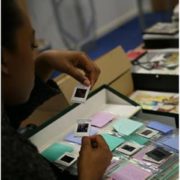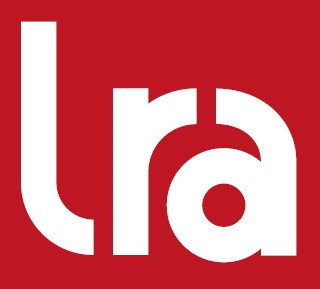What is a Living Refugee Archive and why do we need one? The University of East London’s Library at Docklands has been the home of the Refugee Council Archive for over a decade. According to the Archives Hub database, there are several other archives documenting refugee  lives which co-exist in London and beyond. Questions arise as to who accesses these archives? Are refugee archives well-represented in relation to the preservation of lived experience of refugees and migrants? If not, why is this? Who get excluded from refugee-archives, and in what ways? How could we improve access to refugee research archives?
lives which co-exist in London and beyond. Questions arise as to who accesses these archives? Are refugee archives well-represented in relation to the preservation of lived experience of refugees and migrants? If not, why is this? Who get excluded from refugee-archives, and in what ways? How could we improve access to refugee research archives?
The Living Refugee Archive was established, and is run, by the co-ordinating team of Paul V Dudman, UEL Archivist, and Dr. Rumana Hashem, lead researcher. Paul has been the Archivist at the UEL Library, Archives and Learning Services for over 18 years whilst Rumana has extensive research experience in participatory and anti-oppressive methodologies within the fields of gender, migration and refugee studies. Community engagement has always been an important aspect of our work with our Archive, as it is important that they are made available in accessible formats to encourage interaction with the Archive and to new ways of looking at the future by examining the past.
The Refugee Council Archive now includes a rich documentary heritage including over fifty years’ worth of materials collected by the Refugee Council, now supplemented by additional archival collections including the Council for Assisting At-Risk Academics (CARA), the Northern Refugee Centre Archive, an audio-visual collection from the London Office of the UNHCR, Charter 87 and the Cambridge Refugee Support Group archives. We have also just received an archival collection from the Information Centre on Archives and Refugees, (ICAR).
 Issues of asylum, displacement, migration and seeking refuge are very much a modern concern as well as an historical one, and we are aware of trying to create a balanced archive to reflect this. Balance is important both in terms of the range, type and format of the materials that we collect, but also in terms of memories and voices that we try to preserve within the Archive. It is important from an archival perspective, to endeavour to collect materials which reflect not only the academic and policy approaches to these issues, but also to document and preserve the primary accounts and experiences to enable the archive to be reflective of the many voices associated with asylum, displacement, racism and migration. We are particularly interested to collect oral testimonies for the Archive and we will also aim to include materials from NGO’s and third sector organisations, community groups, and academic bodies to enhance and develop the collection. Official government publications will also be considered.
Issues of asylum, displacement, migration and seeking refuge are very much a modern concern as well as an historical one, and we are aware of trying to create a balanced archive to reflect this. Balance is important both in terms of the range, type and format of the materials that we collect, but also in terms of memories and voices that we try to preserve within the Archive. It is important from an archival perspective, to endeavour to collect materials which reflect not only the academic and policy approaches to these issues, but also to document and preserve the primary accounts and experiences to enable the archive to be reflective of the many voices associated with asylum, displacement, racism and migration. We are particularly interested to collect oral testimonies for the Archive and we will also aim to include materials from NGO’s and third sector organisations, community groups, and academic bodies to enhance and develop the collection. Official government publications will also be considered.
We hope that the Living Refugee Archive will be beneficial to an audience interested in seeking  information within these fields. We will endeavour to try and make the website relevant to academic users including students, researchers, and academics; policy makers; archivists and librarians; members of the media; but perhaps most important of all, we want to try and make the Living Refugee Archive engaging for both community organisations and the local communities they support. We hope this website will be useful as a focal point for information provision and for those who may not have regular access to physical collections. This therefore is the background to our Living Refugee Archive.
information within these fields. We will endeavour to try and make the website relevant to academic users including students, researchers, and academics; policy makers; archivists and librarians; members of the media; but perhaps most important of all, we want to try and make the Living Refugee Archive engaging for both community organisations and the local communities they support. We hope this website will be useful as a focal point for information provision and for those who may not have regular access to physical collections. This therefore is the background to our Living Refugee Archive.
We would like to make clear at this stage that we are aware of the evolving nature of refugee and migration studies and the concerns that are often raised about the use terminology within these fields. As the University of East London now has a long association with the Refugee Council and their archive whilst also running a postgraduate MA in Refugee Studies, we have decided to go with the `Living Refugee Archive’ name to reflect this connection. However, this is not to say that our online archive will only focus on issues pertaining to purely refugee studies. We are very keen for the Living Refugee Archive and digital library to take an open and balanced approach to collection management and we will look to incorporate materials into the website focusing on a broad range of issues and actors. We hope that as the website grows, it will include materials on, for example, issues of: asylum displacement, forced migration, conflict, human rights violations, and related issues.
To help us in this task, we have developed the following supporting policies which will help to guide is in this process:
• Collection Management Policy
• Scope Policy
• Copyright Policy
